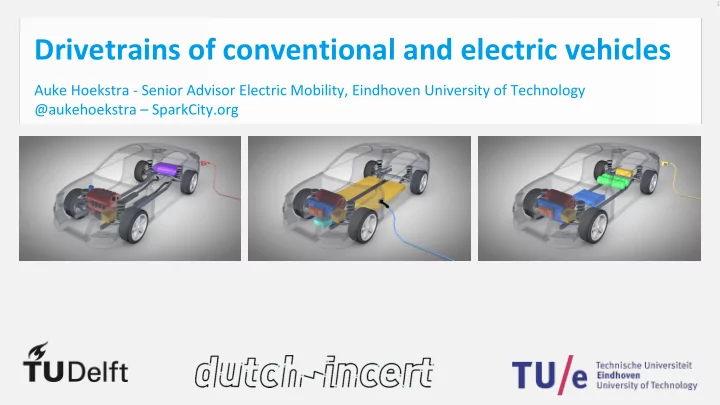

Drivetrains of conventional and electric vehicles Auke Hoekstra - Senior Advisor Electric Mobility, Eindhoven University of Technology @aukehoekstra – SparkCity.org
Internal Combustion Engine • Global warming • Particulate matter (PM) • 75% of energy lost • Noise pollution • Motor is heavy and expensive • Lots of maintenance required
Biofuel is inefficient compared to EVs 100% PV Transport + charge EV 20% 17% 14% 100% Image source: Auke Hoekstra Photosynthesis Refining, transport and fuelling ICE & car 0,38% 0,16% 0,03%
Hybrid Electric Vehicle (HEV) • Electric motor is not only used to start the gasoline engine but also to support it at short stops and low speeds • Less brake wear and other maintenance. • Up to 20% fuel savings.
Plug-in Hybrid Electric Vehicle (PHEV) Advantages • Range not limited by the battery • Most energy can come from electricity with relatively small (<100 km range) battery Disadvantages compared to FEV • Drive train cost and maintenance • Less energy and emission savings
Full Electric Vehicle (FEV) • Electricity only power source • Runs entirely on cheap, small and efficient electric motor • Low maintenance • One pedal driving with regeneration • Big battery for long range • Fast charging capability
Full Electric Vehicle (FEV) cost comparison Cost type Gasoline FEV 2000 FEV 2030 Drive train $15k $20 $5 Battery $0 $100k $10k Fuel $17k – 40k $6k – 10k $6k – 10k Maintenance $18k $12k $6k Total $50k – 73k DIS ADVANTAGE ADVANTAGE $65K – 92K $19K – 46K
Full Electric Trucks (like the Tesla Semi) • Bullet Image source: Wikipedia
Full Electric Trucks (like the Tesla Semi) • More energy use means bigger cost savings • More TCO focus means quicker adoption • My prediction: electric heavy truck adoption will be faster than normal car adoption • But only if we roll out fast- charging infrastructure
Full Electric Trucks: economics Information source: http://bit.ly/eTrucksblog
Hydrogen Fuel Cell Electric Vehicle (FCEV) • Electric vehicle with hydrogen range extender • Small battery but long range • Refuelling is very fast • Efficiency is lower than FEV
Hydrogen is inefficient compared to EVs 20% Transport & charging Full EV 20% 14% left 17% left Image source: Auke Hoekstra Electrolysis Compression & distribution Fuel cell Hydrogen EV 16% left 12% left 7% left 5% left
Hydrogen Fuel Cell Electric Vehicle (FCEV) • Electric vehicle with hydrogen range extender • Small battery but long range • Refuelling is very fast • Efficiency is lower than FEV • Future depends on price developments in fuel cells, storage and electrolysis
Conclusions • Hybrids are more complex than both ICE and FEV • Possible that we skip PHEVs and go directly for FEV • The internal combustion engine is on the way out
Thank you for your attention
Recommend
More recommend